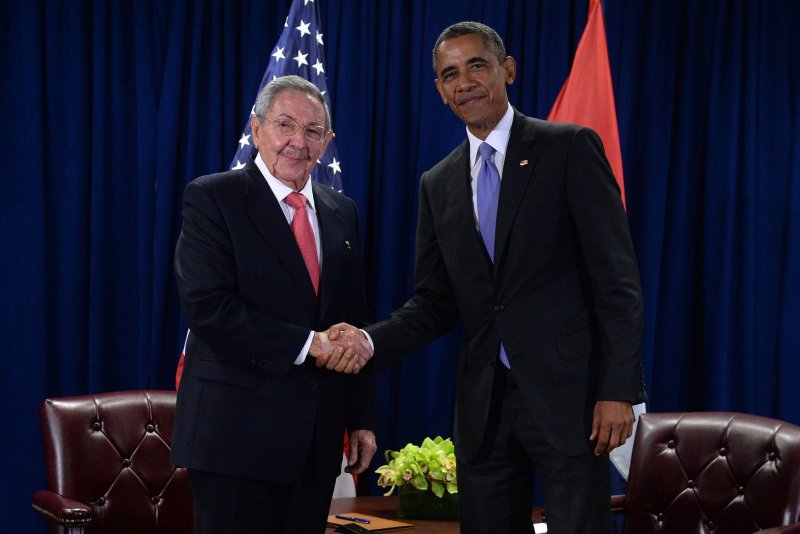1 of 3 | U.S. President Barack Obama, right, shakes hands with Cuban President Raul Castro Tuesday during meeting at the United Nations Headquarters, New York. Pool Photo by Anthony Behar/UPI |
License Photo
NEW YORK, Sept. 29 (UPI) -- President Obama met with Cuban President Raul Castro on the sidelines of the United Nations General Assembly in New York City on Tuesday, marking the first time leaders of the two countries met on U.S. soil in some 60 years.
Ahead of their private meeting, Obama and Castro smiled and shook hands, flanked by Secretary of State John Kerry, National Security Adviser Susan Rice and U.S. Ambassador to the UN Samantha Power. Castro was joined by Cuban aides and officials.
The meeting comes as the Cold War adversaries continue the long and complex process of normalizing relations. Obama and Castro have met before and spoken several times, most recently in advance of Pope Francis' visit to Cuba and the United States. Disputes between the two nations continue over claims for economic reparations, Cuba's desire to end the 53-year-old trade embargo and America's call for Cuba to improve human rights and democracy. Cuba also seeks the return of the land occupied by the U.S. Navy base at Guantanamo Bay, but the United States said that will not happen.
In July, the two countries reopened embassies in Washington and Havana. The Obama administration announced last week it would further ease travel and business restrictions with Cuba, a move that could boost trade ties with the nation.
In his address at the U.N. General Assembly's annual ministerial meeting on Monday, Obama discussed the policy shift toward Cuba and said he was confident Congress would "inevitably lift an embargo that should not be in place anymore."
"Change won't come overnight to Cuba, but I'm confident that openness, not coercion, will support the reforms and better the life the Cuban people deserve, just as I believe that Cuba will find its success if it pursues cooperation with other nations," he said.
Florida Sen. Marco Rubio, a Republican presidential hopeful, expressed concerns about speculation the United States would abstain from voting on an anti-embargo resolution in the UN. Rubio warned he will "consider the administration's position as key to my advice and consent of involved State Department nominees in the coming months."















